|
|
|
Sort Order |
|
|
|
Items / Page
|
|
|
|
|
|
|
| Srl | Item |
| 1 |
ID:
092507
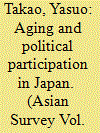

|
|
|
| 2 |
ID:
182937


|
|
|
|
|
| Summary/Abstract |
Many countries in the global South have rapidly aging populations. The COVID-19 pandemic has been especially hard on older adults in these countries, who mainly depend on kin for care. The pandemic has shown that a recommitment to public investment in their well-being is needed.
|
|
|
|
|
|
|
|
|
|
|
|
|
|
|
|
| 3 |
ID:
121886
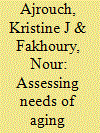

|
|
|
|
|
| Publication |
2013.
|
| Summary/Abstract |
The purpose of this study was to provide a critical perspective on the needs of aging Muslims by focusing on a diverse group of older adults including those with ancestry from African American, South Asian, Arab, and Albanian origins. Four focus group discussions were conducted with adults aged 60+ recruited from four Muslim centers in the metro-Detroit area. Grounded analysis uncovered themes related to needs, strengths and challenges in the Muslim community, as well as suggestions for the way forward in addressing aging issues. Needs identified include quality of life and social relations. Strengths included references to tradition and scripture. Challenges named referred to conflict both within and outside of the family. Finally, the way forward consisted of the desire for options to support aging families within the community, often in small steps, though not necessarily only through mosques. Findings also suggested that women may be a key agent of change within the Muslim community. In sum, this study uncovered areas of overlap and at times disagreement between and within groups, underlining the fact that there is no one kind of Muslim aging, and that any approach to caring for Muslims must combine cultural sensitivity with flexibility in order to minimize anxiety and stress for both elders and their families.
|
|
|
|
|
|
|
|
|
|
|
|
|
|
|
|
| 4 |
ID:
180003
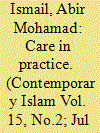

|
|
|
|
|
| Summary/Abstract |
Recent studies conclude that ethnic minority families in Denmark tend to be dismissive of senior housing and municipal homecare services for elderly family members. A large proportion of Muslim minority families in Denmark attach great importance to caring for the elderly as a tradition and prefer to take care of their own elderly family members at home. Nevertheless, the fact that morality, incentives, and obligations in relation to care for the elderly may be legitimized and/or contested with reference to cultural traditions and Islam has not received much attention in current research. In this article, drawing on material from ongoing ethnographic fieldwork among Arab Muslim families in Denmark, I discuss how cultural and religious backgrounds may determine and influence perceptions and behavior regarding care for the elderly. By observing and engaging in the everyday life of an Arab Muslim family, I explore how caring for elderly people with health problems at home raises specific questions about obligations and triggers negotiations across genders and generations. I argue that besides kinship and ethnicity, it is equally important to consider religiosity in an attempt to learn more about how Arab Muslims care for their elderly family members.
|
|
|
|
|
|
|
|
|
|
|
|
|
|
|
|
| 5 |
ID:
174850


|
|
|
|
|
| Summary/Abstract |
The COVID-19 pandemic has taken a devastating toll on the lives of older adults, intensifying long-standing challenges in the US health care system. Persistent health and mortality disparities on the basis of race and socioeconomic status, staffing shortages and insufficient financial resources at some nursing homes, and a reluctance among Americans to make formal plans for their end-of-life health care are problems of heightened magnitude in the pandemic era. Policy solutions like extending Medicare benefits to younger people, increasing Medicaid reimbursement rates, and facilitating formal conversations regarding end-of-life care may help Americans to age and die with dignity.
|
|
|
|
|
|
|
|
|
|
|
|
|
|
|
|
| 6 |
ID:
089757
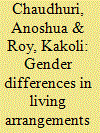

|
|
|
|
|
| Publication |
2009.
|
| Summary/Abstract |
This article uses the 52nd round of National Sample Survey data to examine gender differences in living arrangement choices of the elderly in India. Older women are more likely to live alone than older men, even after controlling for demographics, socioeconomic characteristics, health status, economic independence and property ownership. Economic independence is associated with higher likelihood of living alone for men and women. While physical immobility decreases the likelihood of living with children or extended family for older men, older and physically immobile women are less likely to live alone if they have sons rather than daughters.
|
|
|
|
|
|
|
|
|
|
|
|
|
|
|
|
| 7 |
ID:
131401
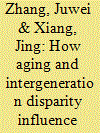

|
|
|
|
|
| Publication |
2014.
|
| Summary/Abstract |
Concurrent with market economic reforms, China is facing an increasing income gap and an aging population. The question addressed in the present paper is how much aging contributes to the rising disparity in consumption. Based on the model established by Ohtake and Saito (1998), our study shows that cohort effects contribute close to 60 percent of the rising consumption inequality, while approximately 10 percent is the result of aging. The growth of aggregate consumption inequality caused by the cohort effect has various implications. Strengthening the redistribution system, especially the tax system, may enable the economy to avoid further increases in income inequality.
|
|
|
|
|
|
|
|
|
|
|
|
|
|
|
|
| 8 |
ID:
147417


|
|
|
|
|
| Summary/Abstract |
Migration of any distance separates family members for long periods of time. In China, institutional legacies continue to privilege the migration of working-age individuals who often leave children and elders behind in the rural areas. Up to now, the literature has treated children and elders analogously, labeling each group as “left-behind.” We argue that analysis of elder stayers needs to be more nuanced, distinguishing among differing groups of elders. Of these groups, those living alone without any adult children in the village are most at risk, while those living with other non-migrant adult children are much less affected by migration. Another group of elders, clearly affected by migration, are those caring for their grandchildren while the children's parents have migrated. Members of this latter group need to be distinguished from those living alone as they are dissimilar in many fundamental ways (age, working status, marital status) and face a very different set of challenges from those left behind (perhaps frail) and alone.
|
|
|
|
|
|
|
|
|
|
|
|
|
|
|
|
| 9 |
ID:
100072


|
|
|
|
|
| Publication |
2010.
|
| Summary/Abstract |
The following article tests the hypothesis that veterans have better health if they were officers when they were in the U.S. military than if they served in the enlisted ranks. It examines this hypothesis by presenting results from logistic regressions that are based on four surveys: the National Survey of Veterans, the Survey of Retired Military, the Panel Study of Income Dynamics, and the Wisconsin Longitudinal Study. In all four of these surveys, the evidence is consistent with the hypothesis that military rank is associated with health, particularly among veterans who served longer. It also suggests that the health gradient by rank is independent of similar gradients by education and income as well as health differences by race. These findings indicate that health may be influenced not just by differences in civilian society but also by those in the military.
|
|
|
|
|
|
|
|
|
|
|
|
|
|
|
|
| 10 |
ID:
153684


|
|
|
|
|
| Summary/Abstract |
Regime type—from authoritarian to democratic—is an important factor in determining the politics of aging and can explain why Singapore has embraced a “Confucian welfare state” model that emphasizes society’s responsibility, while Taiwan has gone from a similar system to a social welfare state more reminiscent of European countries.
|
|
|
|
|
|
|
|
|
|
|
|
|
|
|
|
| 11 |
ID:
101789


|
|
|
| 12 |
ID:
175572
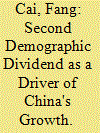

|
|
|
|
|
| Summary/Abstract |
As China's demographic transition enters a new stage, the “first demographic dividend” – the economic advantage resulting from demographic changes in recent decades – is bound to disappear permanently. China's future development will be characterized by an aging population. The “second demographic dividend” refers to new sources of economic growth derived from this later population change. This paper reveals major constraints caused by aging in China, which is characterized by a tendency to grow old before becoming rich. As the population ages, human capital improvement slows, labor force participation declines and consumption power reduces. This paper suggests taking advantage of a population “echo effect” to improve human capital at all ages, to enhance workers’ ability to benefit from employment, and to improve the labor participation rate of the elderly, which in turn would increase the income and social security of the aged. These measures are conducive to future economic growth and to the cultivation of the second demographic dividend.
|
|
|
|
|
|
|
|
|
|
|
|
|
|
|
|
|
|
|
|
|